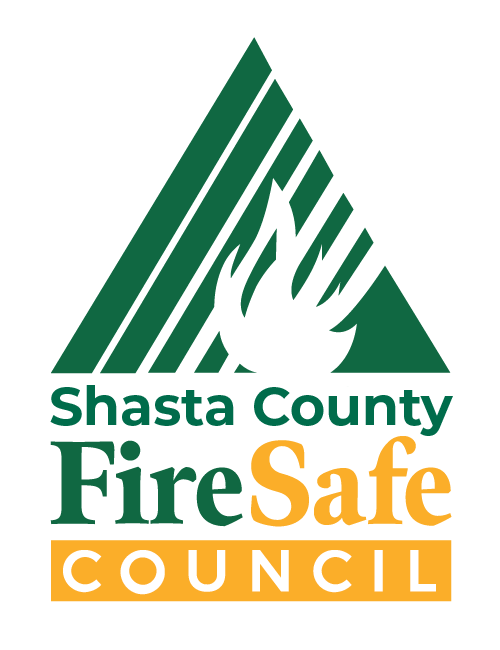The Shasta County Fire Safe Council (SCFSC) is excited to begin providing a free chipping program available to all Shasta County residents. If you are interested in participating in this program, click here https://www.chipperday.com/shastafs and complete the application.
If you are a Firewise Community, once your community has completed the requirements for the chipping service, please contact us to schedule a community event day for chipping at chipper@shastafiresafe.org
2025 Schedule:

How the Chipper Program works:
Do you have low hanging or fallen branches, overgrown brush, or other vegetation that needs chipping? The Chipper Program is an important initiative aimed at reducing the risk of wildfires. The program provides no-cost chipping services to Shasta County residents and property owners who create defensible space around their homes and clear away brush and vegetation that could potentially fuel a wildfire.
- Chippings will NOT be removed – they will be dispursed back onto your property.
- Once enrolled, you will be notified by both text message and/or email message when the event is scheduled.
Please check your junk/spam folders.
While the program operates throughout the year, services will be limited during periods of high fire danger .
Guidelines:
The Shasta County Fire Safe Council provides no-cost chipping of untreated natural materials. If your pile is larger than the maximum size, the operator will leave the excess material unchipped.
- Maximum branch size: 8 inches in diameter by 10 feet.
- Maximum pile size: 8 feet wide by 4 feet high x 10 feet deep (photo below).
- Maximum number of piles: 2
- Minimum branch size: 1 inch in diameter by 3 feet.
- Minimum pile size: 2 feet wide by 2 feet high by 3 feet deep.

To ensure that your piles are chipped:
- Build neat piles with all cut ends facing toward the street or where the chipper will be operated.
- Build piles in areas that can be easily accessed with a truck.
- Make sure that your piles contain no rocks, metal, mud, or building materials.
- Locate piles on level ground, or on the uphill side of the road, outside of drainages
- For operator safety, only include materials that are longer than 3 feet in length
- “Loose” piles are preferable to tightly packed material.
- Be respectful of the contractors’ time.
Our program is NOT able to chip:
- Hazardous plants such as oleander, poison oak, scotch broom, vines, or blackberries.
- Fibrous trees such as palms.
- Roots or decaying wood
- Pinecones, pine needles, leaves, or yard clippings
- Piles that are over 4 feet high or built over standing vegetation.
- Large diameter materials that will not fit through the chipper opening – 8-inch diameter maximum due to potential damage to the equipment.
- Short pieces that will endanger the chipper operators.
- Piles constructed or compacted with mechanical assistance (i.e. with a tractor)
Please make sure all these guidelines are followed. They exist because of contractor limitations, safety, and grant requirements. Failure to follow these guidelines will likely disqualify your piles from being chipped.
The photos BELOW show properly stacked piles versus improperly stacked piles. Correctly done, the limbs can be easily pulled from the top of the pile. The limbs must be hand fed into the chipper so your piles must be stacked by hand. No machine stacked piles!
GOOD piles:


BAD Piles:

DID YOU KNOW?
The time you spend preparing for the Chipper Program can be counted as Volunteer hours for your Firewise community.
The Shasta County Fire Safe Council provides Chipping services:
1. As an alternative to pile burning:
– Benefiting air quality and reducing risk of escapes.
2. As an alternative to dumping:
– Reducing costs and hauling for residents and keeping green waste out of landfills.
3. As an alternative to no action:
– Incentivizing the creation and maintenance of defensible space.
The Shasta County Curbside Chipping program is part of California Climate Investments, a statewide program that puts billions of Cap-and-Trade dollars to work reducing GHG emissions, strengthening the economy, and improving public health and the environment– particularly in disadvantaged communities. The Cap-and-Trade program also creates a financial incentive for industries to invest in clean technologies and develop innovative ways to reduce pollution. California Climate Investments projects include affordable housing, renewable energy, public transportation, zero-emission vehicles, environmental restoration, more sustainable agriculture, recycling, and much more. At least 35 percent of these investments are located within and benefiting residents of disadvantaged communities, low-income communities, and low-income households across California. For more information, visit the California Climate Investments website at: www.caclimateinvestments.ca.gov.
For more information Contact Doug Young:
Email: doug.young@shastafiresafe.org
Phone: 530-360-0120
P.O. Box 338, Palo Cedro, CA 96073




